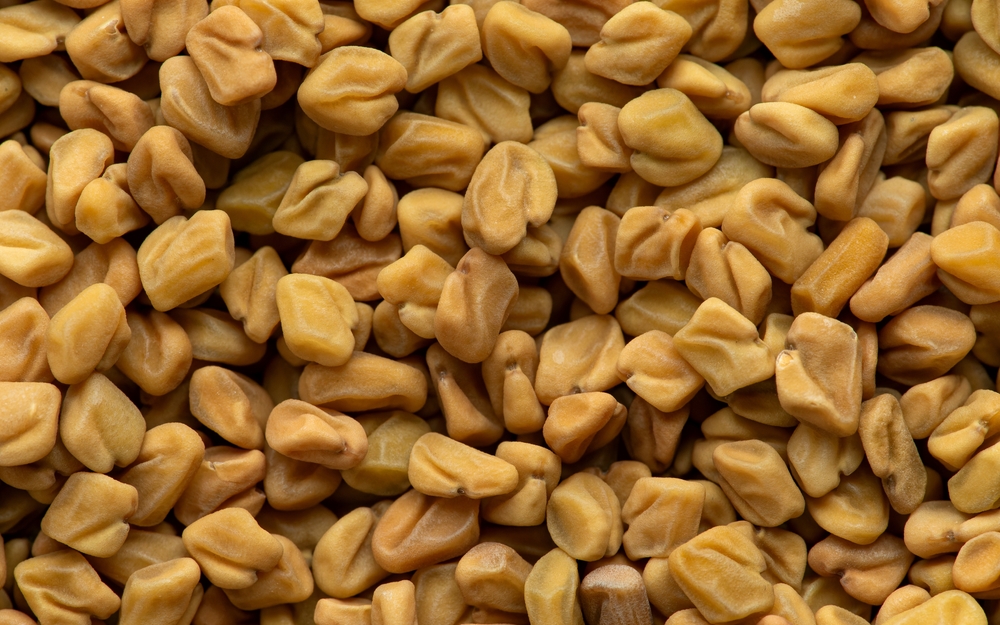Fenugreek, an herb commonly used in cooking and traditional medicine, has gained attention as a potential weight loss aid.
Based on current research, fenugreek appears to offer modest support for weight management primarily through appetite suppression and improved satiety rather than direct fat burning, but it's not a standalone solution for significant weight loss.
Keep reading to discover exactly how fenugreek works in your body, what the latest studies reveal about its effectiveness, proper dosages that actually work, and important safety considerations you need to know before trying it.
What Is Fenugreek and Why Do People Use It for Weight Loss?
Fenugreek is an ancient herb native to the Mediterranean and Asia, where it's been cultivated for over 4,000 years both as a culinary spice and medicinal plant.
You'll recognize its distinctive maple-like aroma in Middle Eastern and Indian cuisines, but today it's gaining popularity worldwide as a dietary supplement.
The weight loss marketing around fenugreek makes some bold promises.
Online retailers and supplement companies claim it can “melt belly fat,” “boost metabolism by 25%,” and “block carb absorption.”
Social media influencers promote fenugreek water as a miracle morning drink that supposedly burns fat while you sleep.
These claims have turned a traditional cooking ingredient into a trending weight loss supplement.
How people typically consume fenugreek for weight management:
- Whole seeds – soaked overnight to make “fenugreek water”
- Ground powder – mixed into smoothies or sprinkled on food
- Standardized extracts – concentrated capsules or tablets
- Raw seeds – chewed directly (though this can be quite bitter)
The reality is more nuanced than the hype suggests.
While fenugreek does have measurable effects on appetite and blood sugar, the research shows modest benefits rather than dramatic transformation.
Most studies demonstrate appetite suppression and improved feelings of fullness, but actual weight loss results have been inconsistent and relatively small.
Traditional medicine has long used fenugreek for digestive health, blood sugar control, and milk production in nursing mothers.
Modern science has validated some of these traditional applications, particularly around blood glucose management and satiety.
However, the leap from “helps you feel full” to “causes significant weight loss” isn't supported by robust clinical evidence yet.
You should approach fenugreek as a potential tool for appetite control rather than expecting it to replace proven weight loss strategies like caloric restriction and regular exercise.
The Science Behind Fenugreek's Weight Management Effects
The key to understanding fenugreek's weight management potential lies in its unique fiber composition.
Fenugreek seeds contain approximately 75% galactomannan, a soluble fiber that transforms into a thick, gel-like substance when it contacts water in your digestive system.
This isn't just any fiber – galactomannan has specific properties that directly impact how your body processes food and regulates hunger.
When you consume fenugreek, the galactomannan fiber swells and forms a viscous gel in your stomach.
This gel physically slows gastric emptying, meaning food stays in your stomach longer before moving to your small intestine.
The result? You feel full for extended periods after eating, which naturally reduces the urge to snack or overeat at your next meal.
Blood sugar regulation happens through two mechanisms:
- Slower carbohydrate absorption – The gel barrier delays sugar molecules from entering your bloodstream
- Reduced glucose spikes – More gradual sugar release prevents the sharp insulin responses that can trigger hunger
The hormonal effects are particularly interesting.
Fenugreek consumption increases levels of cholecystokinin and glucagon-like peptide-1, two hormones that signal fullness to your brain.
Think of these as your body's natural appetite suppressants – when their levels rise, your hunger naturally decreases without conscious effort on your part.
Animal research has revealed more dramatic effects than what we see in human studies.
Rats fed high-fat diets along with fenugreek extract showed significant reductions in body weight gain and white adipose tissue accumulation.
Their leptin levels – the hormone that tells your brain when you have enough stored fat – also decreased substantially.
At the cellular level, fenugreek appears to influence gene expression related to fat metabolism.
Low molecular weight galactomannan extracts have been shown to modulate genes involved in fatty acid synthesis while promoting pathways that break down existing fat stores.
This suggests fenugreek might not just prevent fat accumulation but could potentially help reduce existing fat tissue.
However, translating these promising animal results to humans has proven more challenging, which explains why human studies show more modest effects than the dramatic changes seen in laboratory settings.
What Recent Clinical Studies Actually Show About Weight Loss
The most comprehensive evidence comes from recent large-scale reviews that paint a realistic picture of fenugreek's weight loss potential.
A 2024 meta-analysis examining fenugreek supplementation in type 2 diabetes patients found no significant effect on body weight, though researchers did observe a small BMI reduction of 0.40 kg/m² – roughly equivalent to losing 2-3 pounds for an average-height person.
The 2022 systematic review provides more encouraging news for body composition changes.
After analyzing 29 randomized controlled trials, researchers found that fenugreek supplementation significantly reduced waist circumference by 2.51 cm on average.
While this suggests some impact on abdominal fat distribution, the overall BMI effects remained statistically insignificant across the broader population studied.
Individual studies reveal the nuanced nature of fenugreek's effects:
The most compelling appetite data comes from a 2010 study of 39 overweight men who took fenugreek seed extract for six weeks.
Participants naturally reduced their daily fat consumption by 13% without being told to change their eating habits.
Despite this meaningful dietary shift, no significant weight loss occurred during the study period.
A smaller but more intensive study tracked 12 healthy men who consumed 1.2 grams of fenugreek extract daily for 14 days.
These participants experienced a 12% reduction in total calorie intake and a 17% decrease in fat consumption.
Again, the appetite suppression was clear and measurable, but the study duration was too short to assess actual weight loss outcomes.
Research on satiety effects shows promise but reveals individual variation.
When 18 people with obesity consumed 8 grams of fenugreek fiber with breakfast, they reported significantly increased feelings of fullness throughout the morning.
However, a crossover study of 9 overweight women found that while fenugreek tea decreased subjective appetite ratings, it didn't translate into reduced food consumption during actual meals.
The research limitations are significant and help explain the mixed results.
Most studies involve small sample sizes ranging from 9 to 39 participants, making it difficult to draw broad conclusions.
Study durations typically last only 2-8 weeks, which isn't long enough to assess meaningful weight loss in most people.
Results have been inconsistent even within similar study designs, suggesting that individual responses to fenugreek vary considerably.
These findings suggest fenugreek's primary benefit lies in appetite control rather than direct weight loss, and even those effects may not be universal or dramatic enough for everyone to notice.
Appetite Suppression vs. Actual Weight Loss: Understanding the Difference

Many people assume that feeling less hungry automatically leads to weight loss, but the relationship is more complex than it appears.
Fenugreek's appetite suppression works through physical and hormonal pathways – the galactomannan fiber creates physical fullness while triggering satiety hormones like cholecystokinin and glucagon-like peptide-1.
These mechanisms successfully reduce hunger sensations, but they don't directly burn existing fat stores.
The gap between reduced calorie intake and weight loss becomes clearer when you consider metabolic adaptation.
When you eat less, your body often responds by slightly slowing your metabolic rate to conserve energy.
Additionally, people may unconsciously compensate for eating less at one meal by eating slightly more at another time.
This explains why studies showing 12-17% reductions in calorie intake don't always produce proportional weight loss.
Satiety hormones vs. fat-burning hormones serve different functions:
- Satiety hormones (cholecystokinin, GLP-1) signal when to stop eating
- Fat-burning hormones (norepinephrine, growth hormone) mobilize stored fat for energy
- Insulin regulation affects both hunger and fat storage simultaneously
Fenugreek primarily influences the first category, which is why its effects center on appetite control rather than direct fat mobilization.
The metabolic benefits extend well beyond weight management and may be more reliable than weight loss effects.
Fenugreek consistently improves blood sugar control by slowing glucose absorption, which can reduce energy crashes that trigger cravings.
Many users also experience improved lipid profiles, including lower triglycerides and better cholesterol ratios, even when weight loss is minimal.
Regarding timelines, appetite control effects typically become noticeable within 1-2 weeks of consistent use.
You might find yourself naturally eating smaller portions or feeling satisfied longer after meals.
However, meaningful weight loss – if it occurs – usually requires 8-12 weeks of consistent use combined with other lifestyle changes.
Individual responses vary dramatically based on several factors.
People with higher baseline appetite or those who eat primarily due to physical hunger tend to respond better than emotional eaters.
Your gut microbiome composition, existing hormone levels, and genetic variations in fiber metabolism all influence how effectively you'll respond to fenugreek supplementation.
Some individuals notice significant appetite reduction within days, while others may need 4-6 weeks to experience subtle effects.
Roughly 30-40% of users report no noticeable appetite changes at all, which aligns with the inconsistent results seen across different studies.
Understanding this distinction helps set appropriate expectations – fenugreek may help you eat less, but it's not a direct fat-burning compound like caffeine or green tea extract.
Proper Dosages, Forms, and How to Use Fenugreek for Weight Management
The most practical starting point for weight management is 500-1000 mg of standardized fenugreek extract daily.
This dosage range provides general metabolic benefits while allowing you to assess your individual tolerance and response.
Most commercial supplements fall within this range, making it accessible and affordable for long-term use.
Studies showing more pronounced appetite effects used higher dosages – specifically 1.2 grams of fenugreek seed extract for reducing fat intake and up to 8 grams of fenugreek fiber for significant satiety effects.
However, these higher amounts often cause digestive discomfort in people who haven't gradually worked up to them.
Form effectiveness varies significantly based on concentration and processing:
- Standardized extracts offer the most consistent galactomannan content and highest bioavailability
- Whole seeds provide fiber benefits but require proper preparation for maximum effectiveness
- Ground powder mixes easily into foods but potency varies widely between brands
- Basic capsules may contain mostly filler with minimal active compounds
The traditional fenugreek water method remains popular for good reason.
Soak 1-2 tablespoons of whole fenugreek seeds in water overnight, then drink the liquid in the morning and optionally eat the softened seeds.
This preparation allows the galactomannan fiber to fully hydrate and expand, maximizing its gel-forming properties in your digestive system.
Timing makes a substantial difference in effectiveness.
Take fenugreek 15-30 minutes before your largest meals to allow the fiber to begin expanding in your stomach before food arrives.
Many people find taking it before breakfast and dinner provides optimal appetite control throughout the day without interfering with sleep.
When choosing supplements, look for products that specifically mention galactomannan content or standardization percentages.
Quality manufacturers will list the percentage of active compounds rather than just total fenugreek weight.
Products standardized to contain 50% or higher galactomannan offer better consistency than generic fenugreek powders.
Avoid products with extensive filler ingredients, artificial colors, or proprietary blends that don't disclose actual fenugreek quantities.
Third-party testing certifications from organizations like USP or NSF provide additional quality assurance, though they're not always necessary for effective products.
Start with lower dosages regardless of the form you choose. Even if studies used higher amounts, individual tolerance varies significantly.
You can always increase gradually if you're not experiencing adequate appetite suppression after 2-3 weeks of consistent use.
Safety, Side Effects, and Who Should Avoid Fenugreek
Fenugreek enjoys a generally recognized safety profile when consumed in typical food amounts – the quantities you'd encounter in cooking or moderate supplementation.
However, the concentrated doses often used for weight management can produce side effects that range from mild annoyances to serious health risks.
The most common side effects center on digestive disruption.
Many people experience diarrhea, nausea, or general stomach upset when starting fenugreek supplementation, especially at higher doses.
These effects often diminish as your digestive system adapts, but they can be severe enough to discontinue use during the first week.
One distinctive and harmless but noticeable effect is the maple syrup-like odor that appears in urine and sweat.
This occurs because your body metabolizes compounds in fenugreek that create sweet-smelling byproducts.
While not dangerous, this odor can be quite pronounced and may persist for days after stopping supplementation.
Blood sugar interactions require serious attention, particularly if you:
- Take diabetes medications (metformin, insulin, sulfonylureas)
- Use other blood sugar-lowering supplements (berberine, chromium)
- Have a history of hypoglycemic episodes
- Experience symptoms like dizziness, shakiness, or confusion after meals
Fenugreek can significantly enhance the blood sugar-lowering effects of medications, potentially causing dangerous hypoglycemic episodes.
This interaction doesn't just affect diabetics – even people with normal blood sugar can experience problematic drops when combining fenugreek with certain medications.
Pregnancy and breastfeeding present complex considerations.
While fenugreek has traditionally been used to increase milk production in nursing mothers, animal studies have raised concerns about fertility issues and increased miscarriage risk at higher doses.
The research isn't conclusive enough to establish definitive safety guidelines, making medical consultation essential for pregnant or breastfeeding women.
Allergic reactions can range from mild skin irritation to serious respiratory distress.
Warning signs include difficulty breathing, chest tightness, swelling of the face or throat, and widespread rash or hives.
People with legume allergies (peanuts, soybeans, peas) may have increased risk since fenugreek belongs to the same botanical family.
You should consult healthcare providers before starting fenugreek supplementation if you have diabetes, take blood-thinning medications, have a history of hormone-sensitive conditions, or use medications for thyroid disorders.
The herb can interact with warfarin and other anticoagulants, potentially increasing bleeding risk.
Integration with existing health conditions requires careful monitoring.
People with gastrointestinal disorders like IBS may find that fenugreek's high fiber content exacerbates symptoms.
Those with autoimmune conditions should approach cautiously, as some compounds in fenugreek may stimulate immune system activity.
Start with the lowest effective dose and monitor your body's response carefully during the first two weeks.
Discontinue use immediately if you experience severe digestive upset, unusual fatigue, or any signs of allergic reaction.
Conclusion
Fenugreek offers modest but measurable benefits for weight management through appetite suppression and improved satiety, though it won't produce dramatic weight loss on its own.
The evidence supports its use as a supplementary tool alongside proven strategies like caloric restriction and regular exercise, with most people experiencing subtle appetite control rather than significant fat loss.
If you decide to try fenugreek, start with 500-1000 mg of standardized extract daily, consult your healthcare provider if you take medications, and maintain realistic expectations about its role in your overall weight management plan.







